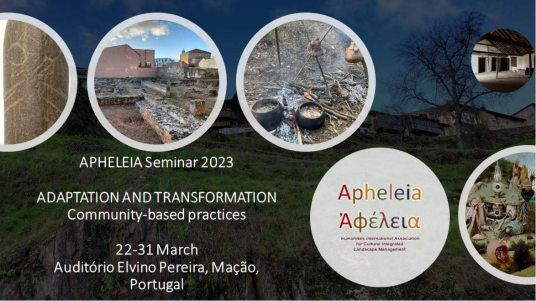Apheleia 2023Adaptation and Transformation: community based practices

Pendant ces 10 ans, plus de100 scholars et 250 étudiants de master et doctorat on été engagés dans ces séminaires et collaboré dans despublications.
APHELEIA (www.apheleiaproject.org) a démarré comme un projet financé par la Commission Européenne (2014-2017), lequel donna origine à une nouvelle association internationale sur la Gestion Culturelle Intégrée des Paysages, concept qu’on discutera lors de votre séjour à Mação.
Cette association est, depuis 2019, membre du Conseil International de la Philosophie et des Sciences Humaines. En 2019, APHELEIA a démarré les actions qui on aboutit, en 2021, à créer un nouveau programme de l’UNESCO, appelé BRIDGES, sur la durabilité et les dynamiques humaines, lequel vient d’être présenté lors de la COP 27.
Le thème du séminaire en 2023, qui se déroulera du 22 au 31 Mars 2023, sera « Adaptation and Transformation : community-based practices » et le programme aura la collaboration, au-delà de Dyclam +, de BRIDGES (UNESCO), The Jena Declaration, Le Club de Rome, et d’autres partenaires.
Le Professeur Robert Belot interviendra le jeudi 23 mars à 11h15.
Ci-dessous le résumé en anglais de son intervention:
How to make community of (with) diversity? The European project and the fiction of historical and cultural heritage
The birth of political Europe is a large-scale example of "community building". In order to constitute itself as a European project, Europe began by thinking and structuring itself in terms of "communities", each community responding to the implementation of particular functions: from coal to the atom, via defense or justice. Critics of the Lisbon Treaty (signed on December 13, 2007) have generally failed to notice that it was a question of making the transition from the European Economic Community to the European Union based on the recognition of a common cultural and historical heritage and the need to finally make it a common policy. But the implementation of this policy comes up against the difficulty of creating a community by dialectically bringing together the demand for the valorisation of "diversities" and the quest for unity. One is therefore entitled to ask the question: is the "European community" an instituting fiction, or does it translate the historical reality of Europe?
Robert Belot, Professeur d’histoire contemporaine à l’Université Jean Monnet (France), titulaire du module Jean Monnet « HISTOREUPA », directeur du master Erasmus mundus DYCLAM+. Derniers livres parus : Patrimoine, Péril, Résilience, Paris, Maisonneuve&Larose/Hémisphères, 2022 (co-dir. Philippe Martin) ; The rebirth of Europe after the war. Hopes, divisions and failure among the French Resistance, Lausanne, Fondation Jean Monnet pour l’Europe, coll. Les Cahiers Rouges, 2022.

 Faculté de Sciences
Faculté de Sciences